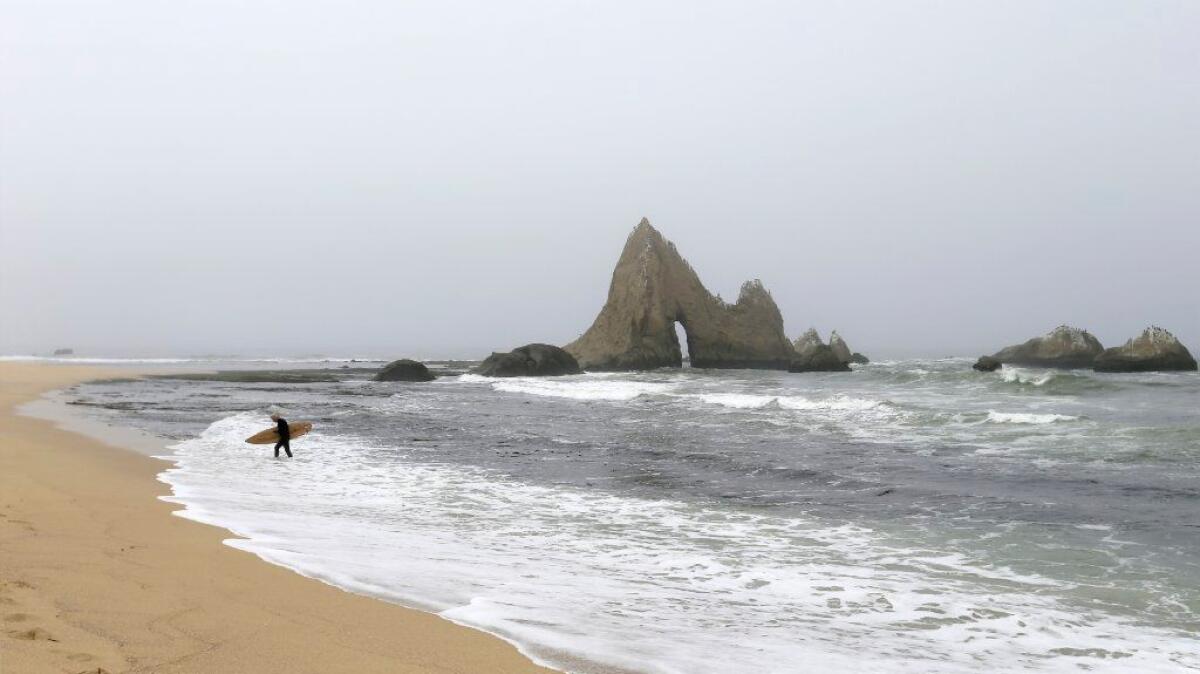A wave of lawsuits follows a billionaire’s effort to keep the public off a Northern California beach

- Share via
Ocean lovers have long been drawn to the tranquility of Martin’s Beach, a sweeping crescent of sand just south of Half Moon Bay.
But a tsunami of litigation began building soon after billionaire Vinod Khosla, a co-founder of the pioneering tech company Sun Microsystems, bought the secluded property for $32 million in 2008.
The family that sold Martin’s Beach had, for almost a century, allowed surfers, fishing enthusiasts and others to reach the sand on foot or by car via an access road. Eventually the family provided public restrooms, a parking lot and a general store.
Khosla posted “do not enter” signs, hired security and shut the gate.
Since the closure, attorneys have filed at least four lawsuits.
If he thought his legal fees have been monumental so far, just wait until his case gets going
— Mark Massara, Surfrider Foundation attorney
On one side of the battle, the Surfrider Foundation and Friends of Martin’s Beach are suing Khosla, demanding public access to this stretch of California coastline.
And Khosla, in turn, has sued the California Coastal Commission, the State Lands Commission and San Mateo County, including its building and planning department.
His latest lawsuit, filed Sept. 30 in San Francisco federal court, accuses the state and local agencies of harassment, singling out his land for unfair treatment and trying to force him to surrender his property rights in violation of the U.S. Constitution.
“Khosla has really stirred things up,” said Mark Massara, an environmental attorney who represents Surfrider. “If he thought his legal fees have been monumental so far, just wait until his case gets going.”
The battle over public access centers on whether Khosla has repeatedly stopped visitors from entering a 49-acre parcel, which includes the access road and beach, and an additional 39.5 acres that contain coastal bluffs.
Court documents state that after the purchase, Khosla shut down the road during the winter, if attendants were unavailable or for private events. Those closures came to the attention of San Mateo County and the Coastal Commission, which sought to keep the road open.
Khosla sued them in June 2009, hoping to end their interference with what he considered to be his property rights. A San Mateo County Superior Court judge, however, dismissed the case, stating that the property owner had to go through the commission’s permit process or enforcement proceedings before he could resort to a lawsuit.
The legal fight resumed in October 2012 after five surfers were arrested on trespass charges for walking past the road’s locked gate and refusing to leave the property.
A few days later, Friends of Martin’s Beach, a group that included two of the surfers, sued Khosla in an attempt to establish a public right to use the road, the parking area and the beach.
Khosla contended the property was privately owned and had never been subject to easements or dedications granting public access.
The pending lawsuit prompted the San Mateo County district attorney’s office to dismiss trespass charges against the surfers because the access issue had not yet been resolved by the courts. The Sheriff ’s Office also stopped making arrests or issuing citations for trespass on the property. Though the road is closed to traffic, at least for the moment people can use it to walk to the beach.
A year after the case was filed, however, a San Mateo County Superior Court judge dealt Friends of Martin’s Beach a setback, ruling there was no right of access. He said the property was subject to the 1848 Treaty of Guadalupe Hidalgo, an agreement that ended the Mexican-American War and required the United States to recognize Mexican land grants.
Martin’s Beach, the judge ruled, had been privately owned long before there were public access laws and the new state of California had claimed no interest in the land. The decision meant Khosla could keep the public off Martin’s Beach, including the sand between the water and mean high tide line, which is defined by the state Constitution as public.
On appeal, state justices decided there was no constitutional right of access and upheld most of the treaty except to conclude there was no evidence to show that it applied to the beach below the mean high tide line. They sent the matter back to the Superior Court to consider whether access to the road and dry, sandy beach should be required because the public has been allowed to use them for decades.
The state Supreme Court later declined to hear the Friends of Martin’s Beach case, but ordered that the appellate opinion not be published, which means the ruling cannot be cited as precedent in similar cases.
A Surfrider lawsuit filed in March 2013 has been more successful. A Superior Court judge ordered the gate to be opened at least as frequently as the family that had owned it kept it open.
Khosla’s failure to secure a coastal development permit before restricting access to the beach was illegal, the judge stated.
Khosla appealed the decision.
That same year, the Legislature passed a bill ordering the State Lands Commission to negotiate with Khosla and try to acquire a public easement within a year. If an agreement could not be reached, the commission was authorized to obtain the necessary land through condemnation proceedings.
Jennifer Lucchesi, executive director of the State Lands Commission, said talks with Khosla are still underway, though the deadline expired in 2015. She declined to discuss details of the negotiations.
In his new lawsuit, Khosla accuses the Lands Commission, the Coastal Commission and San Mateo County officials of employing strong-arm tactics and targeting him for “uniquely disfavorable treatment” by demanding permits, denying permits, refusing to enforce trespass laws and by threatening condemnation proceedings to coerce him into surrendering his professed right to exclude the public.
The lawsuit notes that for years the previous owner of Martin’s Beach made improvements to the property and routinely chose whether, when and how to allow public access, something that San Mateo County and the Coastal Commission never interfered with.
Dori L. Yob, one of Khosla’s attorneys, alleges that after Khosla bought the land, county and Coastal Commission officials repeatedly sought to force him into granting public access on their terms. No other similarly situated property owner in the area has been “subjected to anything close to the same treatment,” the lawsuit states.
The case mentions that privately held beach campgrounds in Santa Cruz, Sturgeon Beach and a popular beach in San Gregorio have not attracted the attention of government agencies as Martin’s Beach has.
“By their logic, if I commit a murder and I am not prosecuted for it, it excuses you if you commit a murder,” said Gary Redenbacher, the attorney for Friends of Martin’s Beach.
San Mateo County Counsel John Beiers said that while property rights are important, “the allegations against the county are an overreach, and the county is confident it will prevail.”
Prior to the current owners, Coastal Commission officials said they never received any complaints or requests for enforcement action on the closure of public access, so there was no reason for them to take action until recently.
The Coastal Commission, which has accused Khosla of closing Martin’s Beach and making improvements without permits, is trying to establish a right of access based on the public’s longtime use of the road and beach.
Among the more than 200 testimonials it has gathered so far is one by Steve Angeja, who said members of his family have visited Martin’s Beach since the 1930s to swim, fish and barbecue their catch.
“We would probably go to the beach 5 to 6 times a year during the summer,” Angeja wrote. “We had our family reunions there for years…. This was the only beach we would go to.”
ALSO
Dead beached whale found to have skull fractures
A wounded California Guard soldier served four combat tours. Now he’s fighting the Pentagon
‘Looks like we drew the short straw:’ Rainstorm crawls in and out of Southern California
UPDATES:
3:10 p.m., Oct. 31: This article was updated with a comment from Coastal Commission officials.
This article was originally published at 5:40 p.m., Oct. 28.
More to Read
Sign up for Essential California
The most important California stories and recommendations in your inbox every morning.
You may occasionally receive promotional content from the Los Angeles Times.











